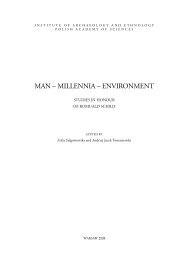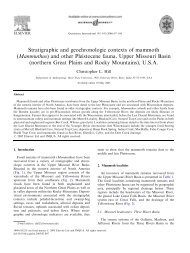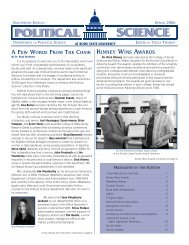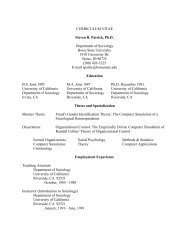From Incivility to Outrage - College of Social Sciences & Public ...
From Incivility to Outrage - College of Social Sciences & Public ...
From Incivility to Outrage - College of Social Sciences & Public ...
You also want an ePaper? Increase the reach of your titles
YUMPU automatically turns print PDFs into web optimized ePapers that Google loves.
Downloaded by [Boise State University] at 17:30 21 December 2011<br />
Political Discourse in Blogs, Talk Radio, and Cable News 21<br />
<strong>of</strong>fer a baseline map <strong>of</strong> the landscape and texture <strong>of</strong> political outrage speech and behavior,<br />
showing that outrage is both abundant and intense. Finally, we explore some <strong>of</strong> the<br />
potential implications <strong>of</strong> these findings and suggest directions for future research.<br />
What We Know About Political <strong>Incivility</strong><br />
Empirical research in political communication and political psychology attempting <strong>to</strong><br />
indentify effects <strong>of</strong> exposure <strong>to</strong> political incivility—as distinguished from mere negativity,<br />
which can exist with or without an uncivil mode <strong>of</strong> delivery 3 —<strong>of</strong>fers complex and at<br />
times contradic<strong>to</strong>ry answers, as is the case with media effects research across most content.<br />
The reigning presumption is that incivility in politics undermines faith in government and<br />
discourages political participation. Findings suggest that exposure <strong>to</strong> uncivil political discourse<br />
in the media erodes political trust, engenders more negative assessments <strong>of</strong> political<br />
institutions and ac<strong>to</strong>rs, decreases the perceived legitimacy <strong>of</strong> political figures, and triggers<br />
increased emotional response (e.g., Forgette & Morris, 2006; Fridkin & Kenney, 2008;<br />
Mutz, 2007; Mutz & Reeves, 2005).<br />
Yet some research suggests that there may be positive effects <strong>of</strong> negative political<br />
speech, such as Geer and Lau (2006), who found that negative (not specifically uncivil)<br />
campaign advertisements actually stimulated voter turnout in Britain between 1980 and<br />
2000. Similarly, Brader (2005, 2006) demonstrated that emotional appeals in campaign<br />
advertising engage audiences, prompting viewers <strong>to</strong> seek out further information. Some<br />
research suggests effects <strong>to</strong>o complex <strong>to</strong> be viewed as positive or negative. For example,<br />
Kahn and Kenney (1999, 2004) found that negative campaign advertisements and negative<br />
news coverage increased voter turnout, but “mudslinging” reduced it, and that the impact<br />
varied based on the status <strong>of</strong> the candidate delivering the message as well as the style <strong>of</strong><br />
the criticism. Similarly, Brooks and Geer (2007) found that incivility disturbed the public’s<br />
sense <strong>of</strong> the value <strong>of</strong> political discussion but that those people viewing uncivil messages<br />
were also more likely <strong>to</strong> vote.<br />
The complexity and contradiction embedded in these results are unsurprising. The literature<br />
includes researchers who vary in the way they define negativity and/or incivility as<br />
well as the way they operationalize these concepts. The scholars also attempt <strong>to</strong> measure<br />
impact in different contexts (labora<strong>to</strong>ry, survey, etc.) after audience members encounter<br />
different media and different genres within individual media. It should be <strong>of</strong> little surprise<br />
<strong>to</strong> find that measurable effects <strong>of</strong> a mock political talk show viewed in a lab might differ<br />
from survey data assessing the measurable effects <strong>of</strong> exposure <strong>to</strong> negative campaign advertisements.<br />
Even without these significant methodological differences, it is a daunting task<br />
<strong>to</strong> isolate the impact <strong>of</strong> one type <strong>of</strong> political speech given the broad and complex political<br />
and media environments in which we operate.<br />
Despite these challenges, the effects <strong>of</strong> uncivil political discourse are worth examining.<br />
The problem is that this effects research exists alongside minimal data on the content<br />
<strong>of</strong> real political discourse. In other words, even if exposure <strong>to</strong> uncivil political discourse<br />
is proven <strong>to</strong> yield measurable outcomes (e.g., apathy, political engagement, diminished<br />
trust), this information is <strong>of</strong> little use without an empirical account <strong>of</strong> the degree <strong>to</strong> which<br />
political discourse is actually uncivil. This is an unexpected imbalance in light <strong>of</strong> the many<br />
corners <strong>of</strong> media studies in which academic research <strong>of</strong>fers exactly the opposite: numerous<br />
analyses <strong>of</strong> media texts accompanied by conjecture about their likely effects yet precious<br />
little empirical data on audiences or users.<br />
There is some content analytic work on incivility in political speech, but it is <strong>to</strong>o<br />
narrow <strong>to</strong> provide a meaningful assessment <strong>of</strong> the state <strong>of</strong> outrageous political discourse







